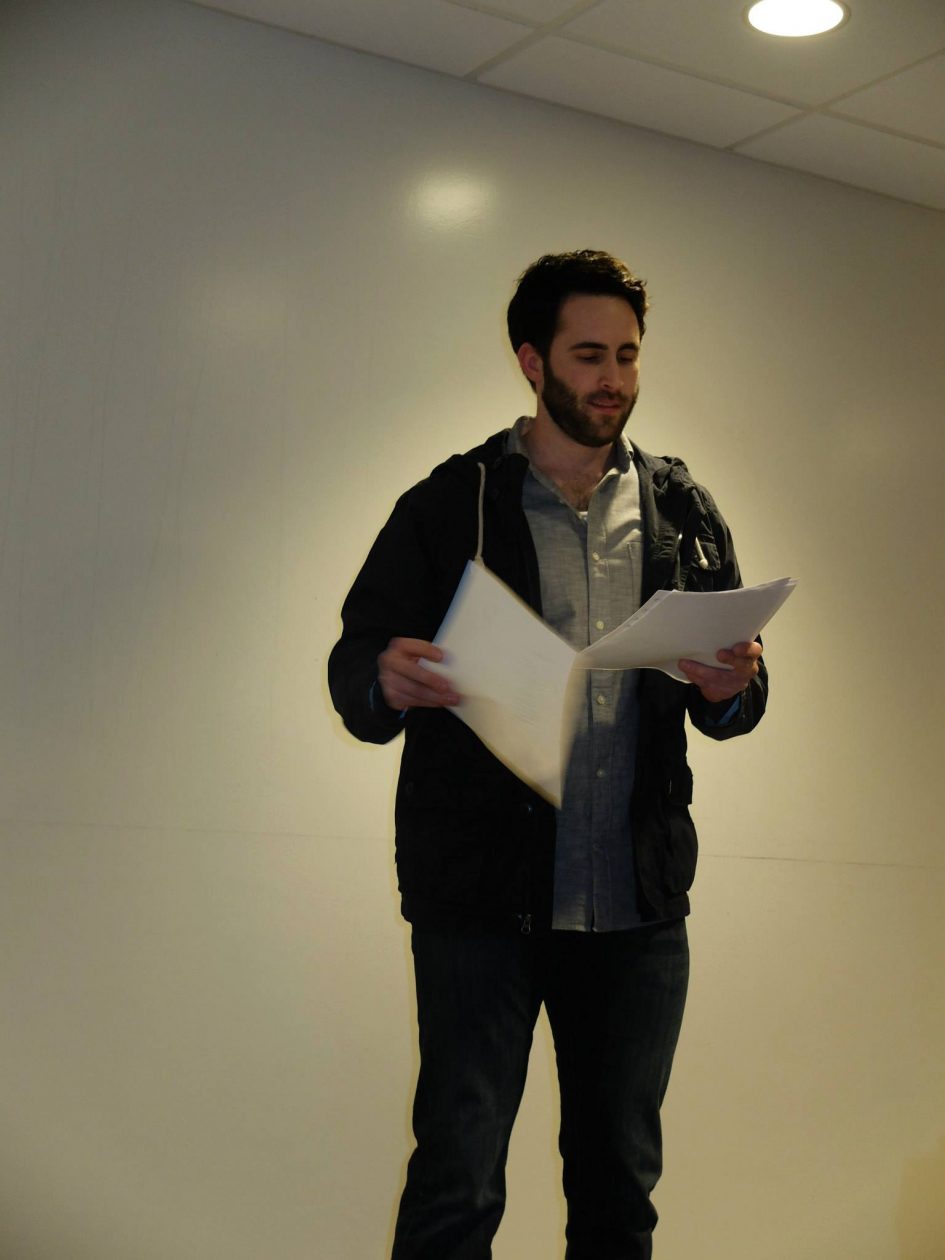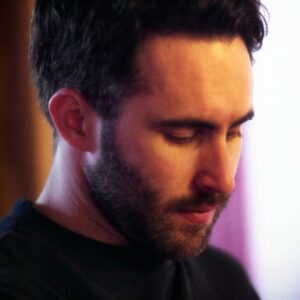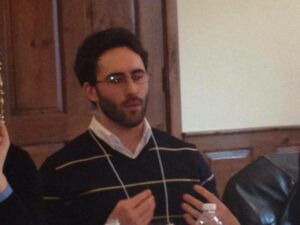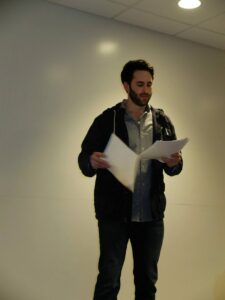
JULIA LEE BARCLAY-MORTON – YOGA, WATER AND REWRITING AUTISM
I interviewed writer Julia Lee Barclay-Morton about her experience of autism. Julia began as an experimental dramatist in New York, moving to the UK to


I interviewed Andrew Dillon, poet and former English teacher at the University of Tennessee about dreams and writing poetry. Andrew’s poems have appeared in several journals including, most recently The Human and Review Americana. He has been described by seventeen-times published poet/translator Marilyn Kallet as ‘a rising star’.
Leslie: Do you use or record dreams to help your writing? Are there other forms of recording you use? How do you turn your records/sketches into finished poetry?
Andrew: I don’t exactly record my dreams. I don’t keep a dream journal; although, I do have a notepad and pen on my nightstand. Actually, I have notepads and pens everywhere: my nightstand, my car, my office, every bag or backpack I might carry – each has its own pad and pen. I also have Dropbox and OneNote on my phone and logged in on any browser I regularly use, so I can make notes or edits anywhere.
But to come back to your question about recording dreams, specifically, I do sometimes wake up and try to record the feeling a dream has left me with. Not usually the narrative (I don’t think my dreams themselves are very interesting), but the surprise, or melancholia, or contentedness, or any other sensation. For example, I’m often struck by how, when someone I know appears in my dreams, they sort of press on my consciousness all through the next day. (I keep trying to get that idea into a poem, but can’t quite articulate it well enough.) Depending on the person, the feeling is different, of course, but I remain sort of sensitive to that person for a day.
The journal next to my nightstand is really for those times, when I’m falling asleep or waking up, that an idea comes to me. Speaking of the immediacy of the poetic impulse, Dorianne Laux’s poem Dust really encapsulates that struggle. Very literally, sometimes I’m just too tired to sit up and write the poem that comes to me in that half-conscious state. I’ve read articles about how the transitional state between unconsciousness and consciousness is very conducive to creativity – it allows you to bypass the process of writing poems and make some interesting connections. Sometimes I can force myself to turn on the lamp, and that’s why the journal’s there.
As far as turning those notes into finished poems, I think my process is idiosyncratic. Maybe every writer says that. I get distracted very easily, so I need a calm environment. I don’t work well at home (with my roommates around) because the only available location is my bedroom, and I try to stay out of my room except to sleep. I usually go to the University of Tennessee library and hide myself in the stacks. I get a cup of coffee and start by reading and listening to poems by other poets (especially Richard Jackson, Jack Gilbert, Deborah Digges, and Danez Smith). When I feel in the mood, I pick some music (something instrumental like Keith Jarrett or The Crusaders) and start a new poem or dig into a draft I want to revise. I have whole lists of poems I want to write, and many are part of series. I’m working on about half a dozen different series right now. I have them organized into different OneNote sections with abstracts and tables with titles and descriptions for each potential poem. In that way, my professional work as a technical writer has been very useful for my creative work. Oh, and I constantly read aloud while writing to make sure the poem is hitting the ear correctly; several of my poems include lyrics, so that often means singing. I love to perform my poems, so I’m not satisfied with a draft until I’m sure every line is pulling its weight sonically and rhetorically.
So, there are a lot of elements to bring together, and I often have a hard time being productive. Most of my writing comes from sessions that I’ve set aside inviolable time for. I’m not very good at writing in the interstices. Marilyn Kallet is my mentor and was the thesis director for my Master of Fine Arts defense; she seems to have a talent for writing when she has a few spare minutes. Occasionally, she sends me drafts to look at, and her first drafts are gorgeous; they look and sound like finished poems. I’m trying to become as disciplined and efficient as she is. In 2014, I attended a workshop she leads in Auvillar, France every spring – Virginia Centre for the Creative Arts‘s O Taste and See: Writing the Senses in Deep France – and it was transformative for me. It was seven days dedicated to writing (and food and wine), which was such a gift. One lesson I took away was the necessity of maintaining a regular practice, because I can’t just jet off to the other side of the world every time my other obligations interfere with writing poetry. So every week I set aside time for a few of these writing sessions; even if I don’t come away with many new lines or revisions, at least I’ve thought critically about my work, which I think plants the seeds for later productivity.
Leslie: I’d like your response to a cautionary tale about poets and the academic approach to literature. It concerns Ted Hughes who had chosen to read English at Cambridge University because he thought this would help his own writing. One night at college he had a strange dream. For some time he had been finding his weekly essay a torment to write, and once again he had ended up sitting over a blank page till 2 am before giving up and going to bed. He dreamt that a fox – a very large fox, as big as a wolf – walked into the room on hind legs. It looked as if it had just stepped out of a furnace, its body charred, its eyes full of pain. It came up to his desk, laid a bleeding hand on the blank page, and said: ‘Stop this – you are destroying us.” For his finals, Hughes switched to anthropology and archaeology.
Given the greatness of Hughes’s poem The Thought Fox, which emerged from this experience, I wonder if you feel there has to be a creative tension between ‘world’ and ‘poet’ to stimulate visionary work. Is the cerebral approach a problem for a poet, or part of the process?
 Andrew: I’m not sure it’s been my experience that there must be creative tension between the poet’s environment and his work. I think it certainly can generate new and interesting writing, but, for me, it wouldn’t be a sustainable way to live as a poet.
Andrew: I’m not sure it’s been my experience that there must be creative tension between the poet’s environment and his work. I think it certainly can generate new and interesting writing, but, for me, it wouldn’t be a sustainable way to live as a poet.
When you say ‘tension’, especially in the context of that Hughes anecdote, I hear that the writer’s personal, professional, and/or academic (etc.) endeavors might be at odds with his creative endeavors. When I was in college and graduate school, and now that I’m a professional (a technical writer), I have felt that those aspects of my life prevented me from writing, and sometimes degraded the quality of my writing. I’m thinking of how I simply have less time to write because I must prioritize my job (and previously classwork, teaching, grading). Additionally, my work as a student (reading and absorbing literature and criticism, conducting research, crafting seminar papers) and as a technical writer can be a drain on my creative faculties. I find tech writing to be similar to writing poetry; so, after 8–10 hours at the office, I often don’t have the cognitive energy to draft and revise poems.
On the other hand, like Hughes, that strain on my time has forced me to finish drafts of poems; whereas, if left to my own timeline, I might take months or years to work a poem to a place I’m happy with. There’s also a way that spreading myself out a bit is beneficial to my writing and other endeavors. I might be broadening your question here, but balancing my mental, physical, and emotional pursuits seems to have generated more, not less work. My brother poet, Cameron Conaway, has written about balance in these terms. For both of us, I think, it’s essential to learn, to be physically active, and to be aware of and communicate the origins of our emotions and how they manifest. My professional work can be mentally stimulating, and I also enjoy studying languages; I’ve played soccer my whole life, and do different kinds of weight training, among other activities; and I try to meditate daily, which, along with writing poetry, forces me to honestly examine and process my emotions.
I wonder if Hughes’s vision was communicating that he was not maintaining a balance – that so much focus on literature and writing was a drain on his creativity. Even when that’s the case for me, I’ve found a few ways to put myself into a creative mood: listening to music, drinking coffee (sometimes whiskey), and above all, reading other poets I admire. Sometimes, just reading through incomplete drafts sparks something, and I find the thread of that original inspiration.
You also asked if the cerebral approach was a problem, or part of the poetic process. In my experience, it’s always part of the process. Even if the original inspiration for the poem came from an emotional place, part of my drafting process will involve performing some kind of research. I often borrow scientific themes that become vehicles for my metaphors, so I’ll spend some time reviewing what I know and searching for new information to make sure I’m  accurately representing, for example, a particular theory of language acquisition, or a biological feedback mechanism. I want to make sure the metaphor doesn’t break down before the reader has gotten to the emotional, more resonant part of the poem—what I might hope the reader takes away from the poem. But even if the poem doesn’t have a controlling metaphor, I still need to read and analyze my various drafts to ensure I understand the implications of what I’ve written. Partly, I want to see where my mind was taking me (maybe subconsciously) during the original draft; but I also sometimes find that I’ve really got more than one poem in a draft, or that part of this draft really fits better with a different poem I’m working on. In the most concise terms, I guess I want to ensure the poem stays focused.
accurately representing, for example, a particular theory of language acquisition, or a biological feedback mechanism. I want to make sure the metaphor doesn’t break down before the reader has gotten to the emotional, more resonant part of the poem—what I might hope the reader takes away from the poem. But even if the poem doesn’t have a controlling metaphor, I still need to read and analyze my various drafts to ensure I understand the implications of what I’ve written. Partly, I want to see where my mind was taking me (maybe subconsciously) during the original draft; but I also sometimes find that I’ve really got more than one poem in a draft, or that part of this draft really fits better with a different poem I’m working on. In the most concise terms, I guess I want to ensure the poem stays focused.
Synesthesia
In defining love, every poet becomes a synesthete—
trying to explain why the letter A is red, or rattle
tastes oaky, trying to order the unfiltered mind:
you orbit the dense, central bridge of my mind the way
twelve numbers every hundred form a chronometric solar system.
I cannot visit my friends’ newborn because baby powder
sounds like a man and woman searching for catharsis
in each other’s mouths. I love you as surely as
twenty-two is closer to my heart than fifteen,
and September is more trustworthy than June.
When I taste Korean food, I lose the ability to distinguish
my mouth from my ears, my throat, my navel—
the awareness of my limbs as distinct and specialized.
Or maybe it can be expressed as simply as this—
when I said time with you feels like two galaxies
recklessly merging their satellites and stars,
I meant I’m already torn from the orbit that anchored me.
Andrew Dillon
You can read more poems by Andrew Dillon here:
Two Poems in Review Americana.
Three poems in Connotation Press.
ABOUT LESLIE TATE’S BOOKS:

I interviewed writer Julia Lee Barclay-Morton about her experience of autism. Julia began as an experimental dramatist in New York, moving to the UK to

I interviewed Gillean McDougall from Glasgow, who edited the collaborative projects Honest Error (on Charles Rennie Mackintosh and his wife Margaret Macdonald) and Writing the

I interviewed French writer Delphine de Vigan, whose book, No et moi, won the prestigious Prix des libraires. Other books of hers have won a clutch

I interviewed Joanne Limburg whose poetry collection Feminismo was shortlisted for the Forward Prize for Best First Collection; another collection, Paraphernalia, was a Poetry Book Society Recommendation. Joanne

I interviewed Katherine Magnoli about The Adventures of KatGirl, her book about a wheelchair heroine, and Katherine’s journey from low self-esteem into authorial/radio success and
| Cookie | Duration | Description |
|---|---|---|
| cookielawinfo-checkbox-analytics | 11 months | This cookie is set by GDPR Cookie Consent plugin. The cookie is used to store the user consent for the cookies in the category "Analytics". |
| cookielawinfo-checkbox-functional | 11 months | The cookie is set by GDPR cookie consent to record the user consent for the cookies in the category "Functional". |
| cookielawinfo-checkbox-necessary | 11 months | This cookie is set by GDPR Cookie Consent plugin. The cookies is used to store the user consent for the cookies in the category "Necessary". |
| cookielawinfo-checkbox-others | 11 months | This cookie is set by GDPR Cookie Consent plugin. The cookie is used to store the user consent for the cookies in the category "Other. |
| cookielawinfo-checkbox-performance | 11 months | This cookie is set by GDPR Cookie Consent plugin. The cookie is used to store the user consent for the cookies in the category "Performance". |
| viewed_cookie_policy | 11 months | The cookie is set by the GDPR Cookie Consent plugin and is used to store whether or not user has consented to the use of cookies. It does not store any personal data. |